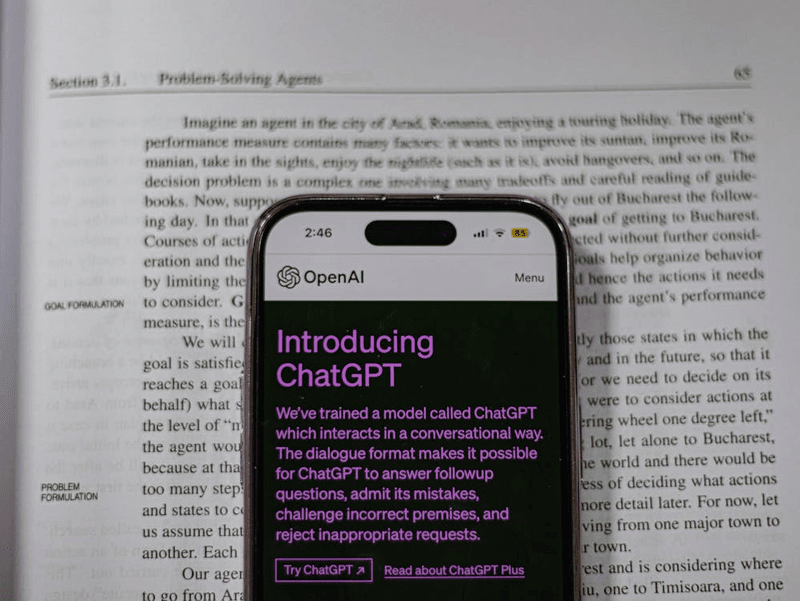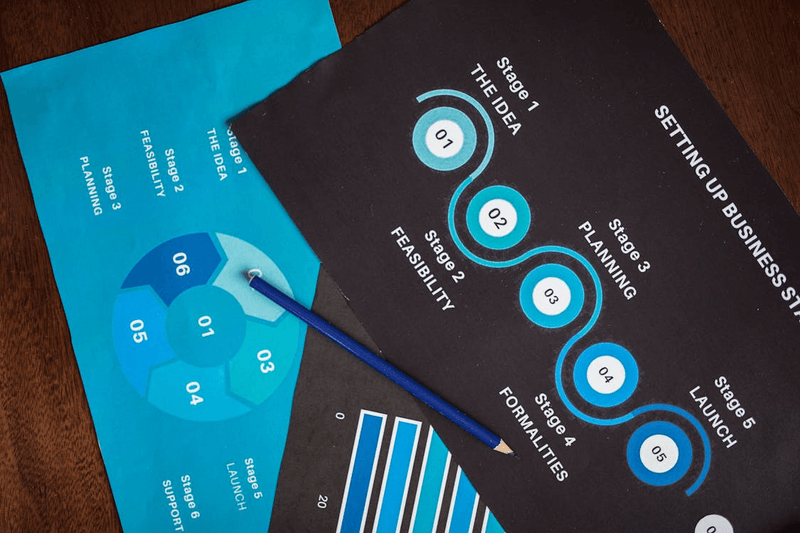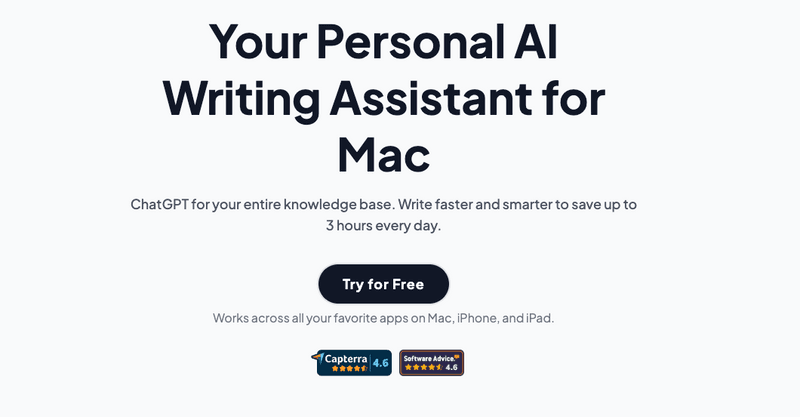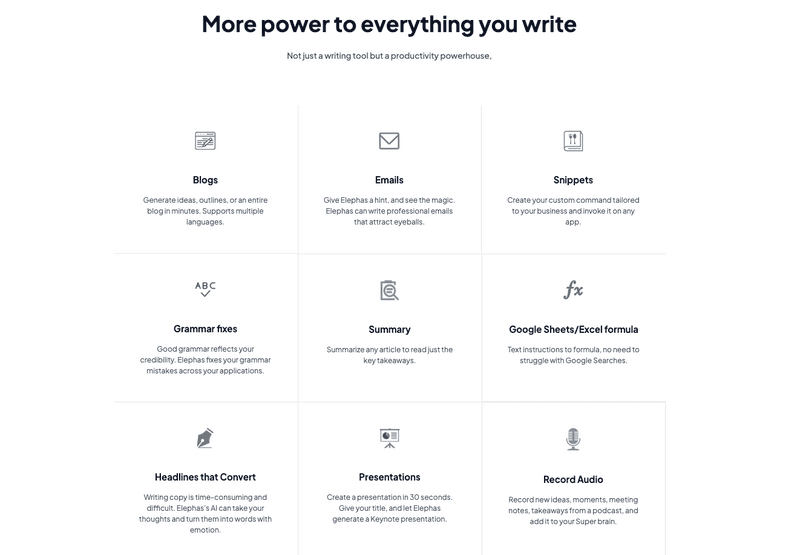How to use ChatGPT to Summarize Research papers | Ultimate Guide (2026)
Managing a large volume of research papers can be challenging and time-consuming. We've all been there - staring at stacks of complex studies, feeling overwhelmed and short on time. It's frustrating when you can't quickly grasp the key points or see how everything fits together.
But what if there was a smarter way to tackle all that research? Imagine having an efficient, tireless research assistant. Who could summarise papers in a snap, always stay up-to-date, and even work offline when you need privacy. That's where AI tools like ChatGPT, Gemini and Elephas come in.
These clever assistants can help you breeze through research papers, pick out the main ideas, and save you hours of work. But which one is right for you? In this article, we'll break down how ChatGPT and Elephas stack up, focusing on Elephas's extra features that make it a real game-changer for students and researchers. Let's get started
Can ChatGPT Summarize Research Papers ?

You bet it can! This clever AI tool is becoming a real game-changer for folks who need to grasp the main points of complex studies quickly.
Imagine you're a busy researcher or student, drowning in a sea of academic papers. ChatGPT can make it easy for you by generating concise summaries in no time. It's like having an efficient, tireless Research Assistant by your side.
You feed ChatGPT the paper, and it picks out the key bits – the main argument, methods, results, and conclusions. It then serves up a neat summary in plain English, with no fancy jargon required.
But it's not perfect. While ChatGPT is pretty good at getting the gist, it might miss some nuances or make small mistakes. That's why it's best to use it as a starting point, not a replacement for actually reading important papers.
The real magic happens when you pair ChatGPT with your smarts. Use its summaries to decide which papers are worth a deeper dive, or to refresh your memory on stuff you've already read.
So, can ChatGPT summarise research papers? Absolutely! Just remember to double-check its work and use your judgment too.
Step-by-Step Guide to Summarize Research Papers with ChatGPT

Ready to turn ChatGPT into your paper-summarizing sidekick? Let's know in detail how can ChatGPT help you in summarizing Research Papers.
Step 1: Gather Your Research Documents
First things first, let's round up those research papers! Whether you're tackling a mountain of PDFs or swimming in a sea of journal articles, it's time to get organized. Create a folder on your computer to keep everything in one place.
Step 2: Pick Your ChatGPT Flavor
Now, let's talk ChatGPT versions. Are you rolling with the free ChatGPT 3.5 or splurging on the fancy ChatGPT Plus with GPT-4o? The free version is cool, but it's got some limits. GPT-4 can handle tougher tasks and even look at images. Choose what works for your wallet and your needs!
Step 3: Prep Your Paper for Its AI Makeover
Time to get that research paper ready for its ChatGPT close-up! If you're using the free version, you'll need to copy and paste the text. But watch out - there's a character limit, so you might need to break it into bite-sized chunks. Got ChatGPT Plus? Lucky you! You can upload the whole PDF in one go.
Step 4: Set the Stage for Your AI Assistant
Before you unleash ChatGPT on your paper, give it some context. It's like briefing a new intern - the more info, the better! Try something like: "Hey ChatGPT, I've got this awesome research paper about the sunflower blooming routine. Can you help me break it down?"
Step 5: Get the Big Picture
Start with the bird's eye view. Ask ChatGPT to give you a quick and dirty summary. Something like: "Can you give me the TL;DR of this paper in a paragraph?" This will help you get the gist before diving into the nitty-gritty.
Step 6: Divide and Conquer
Now it's time to dig deeper! Break that paper down into bite-sized pieces. Try asking:
"What's the main question this paper is trying to answer?"
"Can you explain the method they used like I'm five?"
"What did they find out? Give me the juicy details!"
"What's the big takeaway from all this?"
Step 7: Decode the Science Speak
Hit a paragraph that reads like it's written in alien? No worries! Ask ChatGPT to be your translator. Try: "This part about p-values is making my brain hurt. Can you explain it like we're chatting over coffee?"
Step 8: Connect the Dots
Let's zoom out and see how this paper fits into the big picture. Ask ChatGPT things like:
"How does this research shake things up in the field?"
"Could this change how we do things in the real world?"
"What questions are still left unanswered?"
Step 9: Fact-Check Like a Boss
Remember, ChatGPT is super smart, but it's not perfect. Always cross-check its summary with the original paper. If something seems fishy, don't be shy about asking for a do-over or checking it yourself.
There you have it. You've just turned a complex paper into a clear, concise summary with your new AI Research Assistant. Remember, ChatGPT is here to help you understand better, not to think for you. The more you practice, the savvier you'll get.
Benefits of Summarizing Research Papers With AI

Well, let's talk about how AI can be your lifesaver when it comes to summarizing all that brainy stuff. Here's why using AI to summarize research papers is awesome:
Quick and easy gist-getting: AI can extract the main points of a paper within a few seconds, functioning like a fast, efficient research assistant.
Spot the gaps: AI can help you find those juicy research opportunities by pointing out what's missing in the current literature. Hello, fresh ideas!
Speak everyone's language: Need to explain your fancy research to your grandma? AI can help you whip up summaries that anyone can understand, from regular folks to fellow lab coat wearers.
Time-saver extraordinaire: Let's face it, summarizing papers can be a real slog. AI does the heavy lifting, so you can focus on the fun stuff - like actually doing the research!
Consistency is key: AI doesn't get cranky or distracted. It'll churn out summaries with the same level of detail every time, no coffee breaks needed.
Big picture view: AI can help you see patterns and connections across loads of papers that you might miss when you're deep in the research weeds.
Limitations of ChatGPT in Summarizing Research Papers

ChatGPT is great at tackling those mountain-high stacks of research papers. While it's a super handy tool, it's got its quirks. Here's the lowdown on what ChatGPT can (and can't) do when it comes to summarizing research:
Here are the key limitations of ChatGPT in summarizing research papers:
Outdated knowledge: ChatGPT's info stops in 2021, so it can't handle recent papers accurately.
Hallucinations: It might make up details when given new info, leading to inaccurate summaries.
No direct PDF uploads: In ChatGPT 3, you have to copy-paste text, which is a hassle for long papers.
Character limits: ChatGPT 3 has restrictions on input length, making it tough to summarize lengthy papers.
Limited free access: ChatGPT 4o allows document uploads, but free users only get a few searches.
Paid version needed: To fully use ChatGPT 4o for research papers, you need to pay for more searches.
Not a replacement for reading: It's best used as a starting point, not a substitute for actually reading important papers.
Fact-checking required: Always double-check ChatGPT's summaries against the original paper.
Misses nuances: While it gets the main points, it might overlook subtle details or arguments.
No context awareness: It can't understand the broader research landscape or connect papers to ongoing debates in the field.
Remember, ChatGPT is a helpful tool, but it's not perfect. Use it wisely and always rely on your judgment when working with research papers!
How Elephas Can Help You in Summarization and More Than That…

We just talked about how ChatGPT has some limits, right? Well, guess what? There's another cool AI tool called Elephas that might just be your new best friend for tackling those tricky research papers. Let's know more about, how Elephas can help you summarize and do so much more!
Think of Elephas as ChatGPT's super-smart cousin. Here's why it might become your go-to helper:
Web searching whiz: Unlike ChatGPT, Elephas can look stuff up on the internet. This ensures access to the most current research information.
Works offline for privacy: Scared about your data getting out there? No worries! Elephas can work without the internet, keeping your research under wraps.
Rewriting magic: Got a paper that reads like gibberish? Elephas can rewrite it in four different ways - from super clear to super friendly. It's like having a personal translator!
Smart writing Assistant: Elephas can help you keep the words flowing. It's like having a brainy friend to bounce ideas off of.
Grammar fixer: It helps identify and correct typographical and grammatical errors. Elephas catches them for you, making your writing look super polished.
Reply helper: Need to write back to your professor about that paper? Elephas can help you create the perfect response, whether you need to sound smart or casual.
Content remix master: Want to turn that long research paper into a snappy blog post? Elephas has got your back, helping you reshape your content for different uses.
Your brain booster: You can even teach Elephas about your specific research area. It's like having a mini-you to help with writing!
Writes like you: Elephas can learn your writing style, so everything sounds like it came straight from you, not a robot.
On-the-go helper: Got an idea while you're out and about? No problem! Elephas works on your phone too.
So, while ChatGPT is cool, Elephas might be the extra boost you need to rock those research papers. It's like having a super-smart, always-ready research assistant in your pocket.
Step-by-Step Guide to Summarize Research Papers Using Elepahs

Now we know that Elephas is much better than ChatGPT. Let's learn more about how you can start summarizing a research paper using Elephas step by step.
Step 1: Gather Your Research Goodies
First up, round up those documents you want to summarize. The cool thing about Elephas? It's not picky! PDFs, images, Word docs, even stuff from Notion or Obsidian - bring 'em all! Or, if you're feeling lazy, just use what you've already uploaded to your Elephas Super Brain.
Step 2: Feed Your Elephas
Time to make Elephas smarter! Upload your docs to the Super Brain. It's like giving Elephas a tasty research snack. And don't worry about file size or page count - Elephas has a big appetite!
Step 3: Chat It Up!
Here's where the magic happens. Start asking Elephas questions about your documents. Want a quick summary? Just ask! Curious about a specific part? Fire away! It's like having a super-smart research assistant who's read everything.
Step 4: Keep It Simple, Silly
No need for fancy words or long-winded questions. Elephas is pretty smart, so keep your prompts short and sweet. It's designed to get what you need with just a few words.
Step 5: Dive Deeper
Got the basics? Awesome! Now, start exploring. Ask Elephas to explain tricky concepts, compare ideas from different papers, or even spot trends across your research. It's like having a mini-professor in your pocket!
Step 6: Make It Your Own
As you chat with Elephas, you'll get a feel for what works best for you. Maybe you like bullet-point summaries, or perhaps you prefer chatty explanations. Customize your questions to get exactly what you need.
Step 7: Review and Reflect
Don't forget to double-check what Elephas tells you against the original docs. It's super smart, but nobody's perfect! Use its insights as a starting point for your awesome ideas. But the best part is that you can use Elephas web search features to quickly double-check the content if you have any doubts.
And there you have it! With Elephas, summarizing research papers is less like pulling teeth and more like having a cool convo. No more drowning in jargon or falling asleep on your keyboard. Just upload, ask, and let Elephas do the heavy lifting.
Differences Between Elephas and ChatGPT
After getting the hang of Elephas for summarizing your research papers, you might be wondering how it compares to ChatGPT. Well, let's break it down in a way that's easy to understand and fits right in with what we've been talking about.
First off, both Elephas and ChatGPT are pretty smart cookies when it comes to helping with research. But Elephas has some neat tricks up its sleeve that make it extra helpful for students and researchers. Let's look at the main differences:
1. Document Handling:
Elephas is like that friend who's cool with whatever you throw at them. PDFs, images, Word docs - you name it, Elephas can handle it. ChatGPT, on the other hand, often needs you to copy and paste text, which can be a real pain when you're dealing with long papers.
2. Staying Up-to-Date:
Here's a big one - Elephas can search the web for the latest info. ChatGPT's knowledge has a cut-off date, so it might not know about the newest research. With Elephas, you're always working with fresh info.
3. Your Personal Touch:
Elephas learns how you write and think. It's like having a mini-you helping out. ChatGPT is smart, but it doesn't adapt to your style in the same way.
Now, let's talk about how Elephas makes the whole process easier:
1. Uploading is a Breeze:
Remember how we talked about gathering your research? With Elephas, you can just upload everything at once. No need to copy-paste or break things into chunks like with ChatGPT.
2. Ask Once, Get More:
When you chat with Elephas, you can ask about multiple papers at the same time. It's like having a study group for all your research in one go.
3. Your Research Assistant Grows With You:
The more you use Elephas, the better it gets at understanding your field. It's like having a research assistant that gets smarter every day.
4. From Paper to Presentation:
Need to turn your research into something else, like a blog post? Elephas can help reshape your content, saving you tons of time.
5. Always There When You Need It:
Got a bright idea while you're out and about? Elephas works on your phone too, so you can jot down thoughts or summarize papers wherever you are.
What Makes Elephas Many More Times Better than ChatGPT

Let's get deeper into what makes Elephas stand out, especially when it comes to working offline and using different AI models.
Offline Power: Here's something cool about Elephas - you can use it without being connected to the internet! This is huge for a few reasons:
Privacy Protection: Working offline means your research stays private. No worries about sensitive data being sent over the internet.
Work Anywhere: Stuck on a plane or in a place with bad Wi-Fi? No problem! You can still get your research done.
Faster Performance: Sometimes, working offline can be quicker, especially if you have a slow internet connection.
ChatGPT, on the other hand, always needs to be online. So if your internet goes down, does your research helper?
AI Model Flexibility: Now, this is where Elephas shines. It's like having a Swiss army knife of AI models at your fingertips:
Mix and Match: Elephas lets you choose from different AI models like Claude, Groq, Gemini, and yes, even ChatGPT!
Best Tool for the Job: Different research tasks might work better with different AI models. Elephas lets you pick the best one for what you're doing.
Stay Up to Date: As new AI models come out, Elephas can add them to its toolkit. You're always working with the latest and greatest.
With regular ChatGPT, you're stuck with just one model. It's like only having a hammer when sometimes you need a screwdriver.
In a nutshell, while ChatGPT is pretty cool, Elephas feels more like it was made just for researchers and students. It takes care of the annoying stuff - like dealing with different file types or searching for up-to-date info - so you can focus on the important part: understanding and using your research.
So, if you're knee-deep in research papers and looking for a tool that gets what you need, Elephas might just be your new best friend. It's not just about summarizing papers; it's about making your whole research journey smoother and more fun. Give it a try and see how it can supercharge your study sessions!
Conclusion
So, there you have it - the lowdown on using AI to tackle those tricky research papers. We've seen how both ChatGPT and Elephas can be real lifesavers when you're drowning in academic jargon.
But let's be real - Elephas seems to have the edge here. It's like the Swiss Army knife of research tools, ready for whatever you throw at it. From working offline to keep your ideas safe, to letting you pick and choose different AI models, Elephas is built to make your research life easier.
Remember, though, these tools are here to help you, not do the work for you. They're like having a powerful research assistant, not a replacement for your brain power. Use them to get the big picture, spot connections you might have missed, and save time on the boring stuff.
The best part? The more you use a tool like Elephas, the better it gets at understanding your needs. It's like having a research assistant that grows with you.
So, next time you're faced with a mountain of papers, Why not give Elephas a shot? It might just be the secret weapon you need to conquer your research challenges and come out on top.
FAQs
1. What is the best summarizer tool for a research paper?
Elephas is the best summarizer tool for research papers. It handles various file formats, works offline, and uses multiple AI models. Elephas can search the web for up-to-date information, adapt to your writing style, and summarize multiple papers simultaneously, making it superior to tools like ChatGPT.
2. Can ChatGPT read a PDF and summarize it?
Yes, ChatGPT can directly read PDFs, but you need to have a ChatGPT-4o version to upload documents to ChatGPT and ask questions. However, in the free version of ChatGPT-4o, you only have limited searches per day.
3. Can you use ChatGPT to summarize a research paper?
Yes, you can use ChatGPT to summarize research papers. Copy-paste the paper's text into ChatGPT and ask for a summary. However, ChatGPT has limitations: it can't access the latest research, may miss nuances, and requires fact-checking. It's best used as a starting point, not a replacement for reading.
Comments
Your comment has been submitted